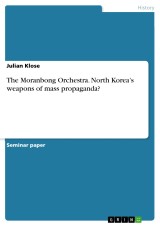Details

The Moranbong Orchestra. North Korea's weapons of mass propaganda?
1. Auflage
|
15,99 € |
|
| Verlag: | Grin Verlag |
| Format: | |
| Veröffentl.: | 26.03.2020 |
| ISBN/EAN: | 9783346138095 |
| Sprache: | englisch |
| Anzahl Seiten: | 30 |
Dieses eBook erhalten Sie ohne Kopierschutz.
Beschreibungen
Seminar paper from the year 2019 in the subject History - Asia, grade: 1,0, University of Heidelberg, language: English, abstract: The first appearances of the Moranbong orchestra raised hopes of more liberal policies under the then-new North Korean leader Kim Jong-un. Looking at Moranbong to start with seems therefore promising for numerous reasons. First, the band is a reminder that there is more in North Korea than nuclear weapons and a "little rocket man". It recognises North Koreans as human beings with a particular taste in music, fashion, and entertainment living within the barriers set by the political system. Since no political system is totally unresponsive to popular interest, research might indicate get an idea of "North Koreaness" under Kim Jong-un. Second, there is remarkably little research on 21st century North Korean music in general and Moranbong in particular. Existing research has explored either a cultural or a technical approach by examining the cultural motives, styles or performance techniques.
Building on these findings, this paper asks whether Moranbong could be another tool employed by Kim Jong-un to legitimate his regime. It is argued here that even a system like North Korea cannot exist repression alone but needs to build a certain degree of support by the population, i.e. legitimacy. It is argued here that Moranbong serves both functions by providing a veritable propaganda tool to the North Korean regime. This tool can be directed at both the domestic and foreign audiences by implementing associations and symbols recognized by the respective audiences. Pyongyang can adjust this tool to serve the expectations of the respective audiences. This means neither a cultural liberalization nor "putting old revolutionary wine into new aesthetic forms". but a new style of North Korean music in the 21st century.
The argument is examined as a historical case study drawing on North Korean primary and secondary sources. The methods and challenges of the methodology are further explained in the next chapter as well as the theoretical framework of legitimation and propaganda. The third chapter offers a discussion of the contested concepts. The fourth chapter illustrates the theoretical argument in an empirical analysis. Particular attention is paid to the performance style, the content and the international context of the Moranbong performances. Chapter five sums up the analysis, discusses its limitations and outlines possibilities for further research.
Building on these findings, this paper asks whether Moranbong could be another tool employed by Kim Jong-un to legitimate his regime. It is argued here that even a system like North Korea cannot exist repression alone but needs to build a certain degree of support by the population, i.e. legitimacy. It is argued here that Moranbong serves both functions by providing a veritable propaganda tool to the North Korean regime. This tool can be directed at both the domestic and foreign audiences by implementing associations and symbols recognized by the respective audiences. Pyongyang can adjust this tool to serve the expectations of the respective audiences. This means neither a cultural liberalization nor "putting old revolutionary wine into new aesthetic forms". but a new style of North Korean music in the 21st century.
The argument is examined as a historical case study drawing on North Korean primary and secondary sources. The methods and challenges of the methodology are further explained in the next chapter as well as the theoretical framework of legitimation and propaganda. The third chapter offers a discussion of the contested concepts. The fourth chapter illustrates the theoretical argument in an empirical analysis. Particular attention is paid to the performance style, the content and the international context of the Moranbong performances. Chapter five sums up the analysis, discusses its limitations and outlines possibilities for further research.
Diese Produkte könnten Sie auch interessieren:

The Last Samurai - Japanische Geschichtsdarstellung im populären Kinofilm

von: Daniel Scherrer

34,99 €















